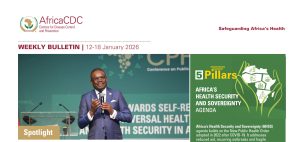The Africa Centre for Disease Control (Africa CDC) is set to kick off action towards strengthening and harmonising the framework of policies, procedures, and practices that ensure healthcare data is managed, protected, and used responsibly throughout its lifecycle — health data governance — across the continent.
The landmark commitment on health data governance was made at the 2025 Africa Health ExCon, held in Cairo, Egypt, during a roundtable on ‘Strengthening Health Data Governance in Africa in the Artificial Intelligence Era’, co-hosted by Africa CDC, AUDA-NEPAD and Transform Health.
Africa CDC announced that it will lead efforts to develop a Continental Health Data Governance Framework, to be tabled for endorsement by Member States at the AU Summit in February 2026.
“Such a framework would establish an agreement between Member States around optimal legislation and regulation for the effective and equitable governance of health data, and build continental alignment and collaboration around a harmonised African position on health data governance that supports cross-border data flows, with the needed protections in place,” said Dr Martha Terefe, Deputy Chief of Staff, Africa CDC, in her welcome remarks.
“Data is king, but governance is the throne,” said Dr Esperance Luvindao, Minister of Health and Social Services in Namibia.
Dr Luvindao couldn’t have been more urgent. In today’s era of digitalisation and Artificial Intelligence, it is crucial to treat data as a valuable asset rather than allowing it to become a liability. Health data should inform decision-making, help predict disease outbreaks, and guide policy development. However, without reliable, ethical, and coordinated governance, we risk losing control over this invaluable resource.
“Health data is powerful. When governed well, it can strengthen health systems, improve health outcomes, support real-time decision-making, and close equity gaps. It can enable what we call precision public health — the ability to tailor interventions based on real, timely, and localised data,” said Dr Terefe.
The Framework will be informed by the AU Data Policy Framework and existing good practice and approaches currently employed by countries, while building on existing norms and standards, including the equity and rights-based principles set out in the widely endorsed Health Data Governance Principles.
Africa CDC, at the request of Member States, has further committed to providing technical assistance and normative guidance to Member States to strengthen local capacity and support the development or enhancement of national health data governance legislation and regulation.
“The commitment reflects the collective resolve of the continental agency to strengthen the governance, protection, and responsible use of health data as a cornerstone for equitable, resilient, and people-centred health systems,” said Judith Nguimfack, Principal Digital Delivery Specialist, Africa CDC, who moderated the session.
In the face of a fast and ever-evolving governance landscape in the era of artificial intelligence and emerging technologies, Africa CDC is marking a turning point in Africa’s digital and health transformation agenda. It anchors health data as a strategic asset to drive evidence-based policymaking, ensure data sovereignty, enhance public health outcomes, boost innovation, streamline the industry, and uphold the rights and trust of African citizens.
The commitment towards a harmonised Continental Framework will foster the exchange of experiences and good practices across the continent, establish a common understanding and agreement around essential legislative provisions, support legal coherence across jurisdictions, enhance trust and facilitate cross-border data sharing and promote the development and scaling up of innovations across countries.
The commitment builds on the African Union’s existing instruments like the Malabo Convention on Cybersecurity and Personal Data Protection (2014), the Science, Technology and Innovation Strategy for Africa 2034 (STISA-2034), the Digital Transformation Strategy for Africa (2020–2030), the Africa CDC Digital Transformation Strategy (2023), The AU Data Policy Framework (2022), and the AU Continental AI Strategy (2024–2030). It complements ongoing initiatives under Africa CDC, the Africa Union High-Level Panel on Emerging Technologies – APET, AUDA-NEPAD, and the African Union Commission.
The ongoing work of the Africa CDC Flagship Initiative on Health Data Governance, launched in 2023, aims to support regional efforts to strengthen health data governance.The initiative will support these efforts, including leveraging recent resources, tools, technical support packages, research, and the collective support of flagship partners.
“This commitment by Africa CDC represents an important milestone on this journey. As one of the Flagship co-chairs, Transform Health is committed to continuing to support these efforts — towards more robust health data governance that safeguards rights, strengthens systems, and unlocks the potential of data for health for all in the digital age,” said Mathilde Forslund, Executive Director, Transform Health.







